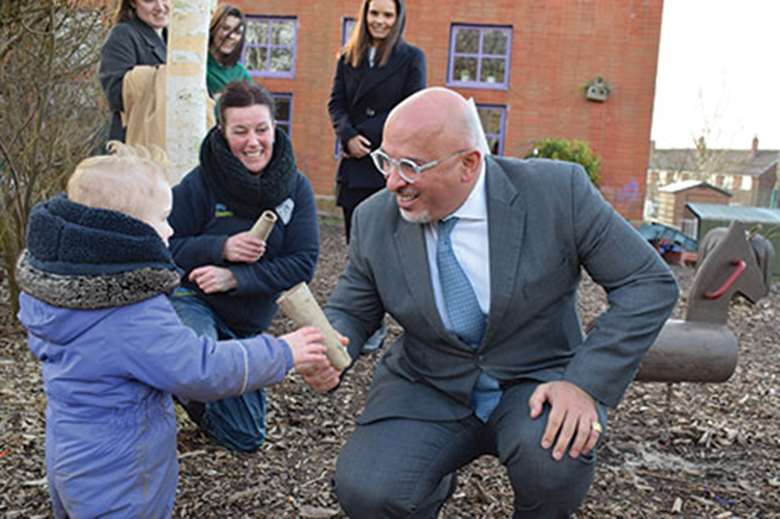Exclusive: Minister unveils details of £20m early years training fund
Monday, June 10, 2019
Children’s minister Nadhim Zahawi has expanded a range of measures to help tackle the language and literacy gap among five-year-olds in the most disadvantaged areas by training practitioners.

The Department for Education has awarded the tender to deliver early years training to the Education Development Trust in partnership with Elklan, as part of the £20m Early Years Professional Development Fund, first announced last year.
From January they will train more than 3,000 early years practitioners across 53 local authorities in around 1,500 schools and PVI settings to support children’s early language, literacy and numeracy skills.
Announcing the plans exclusively in Nursery World, Mr Zahawi said, ‘We will provide training for 3,000 early years practitioners. We hope to reach 60,000 children focusing on the most disadvantaged areas.’
He said the training was about ‘upskilling, making sure they have the skill set to support children’s early language and literacy skills'.
The move is ‘all part of a whole strategy’ in response to the 28 per cent of children at the end of Reception who do not have the expected level of language, communication and literacy skills, ‘children with poor vocabulary at the age of five'.
The training will start in January 2020.
The value of the training partner contract is up to £4m and around £500,000 will be used to commission an independent evaluation.
The bulk of the funding will be allocated to local authorities to facilitate the local continuing professional development (CPD) partnerships of school and PVI nurseries, as well as the cost of making sure there are still enough nursery staff, while other staff are on the training.
The 53 local authorities selected for the Early Years Professional Development Programme

Education secretary Damian Hinds has pledged to halve the number of children starting school below the expected level for speaking and reading by 2028.
The DfE has also published maps which show that as part of its £100m early years social mobility programme it is now funding over 400 projects in more than 130 councils.
‘This will make a real difference to children’s lives in the future,’ the minister said.
Early Years Outcomes Dashboard
Also launched today, as part of the Department for Education’s £8.5m early years local government programme to improve services, is the Early Years Outcomes Dashboard, which will allow local authorities to compare children’s development at the age of five to ‘help focus on children’s key metrics’, the minister said.
The data tool which allows councils to easily compare attainment between disadvantage children and their peers at the age of five on key metrics so that they can benchmark their performance.
The Early Years Outcomes Dashboard includes:
- the percentage of children who achieve a good level of development
- the percentage of children achieving at least the expected level of development for communication and language and literacy (combined)
- the percentage of children achieving at least the expected level of development for communication and language, literacy, and numeracy
- the percentage of children benefitting from funded early education places for the two-year-old offer and funded early education (first 15 hours) for three and four year olds.
The department has also started Wave 2 of peer reviews to support 10 more local authorities to improve the effectiveness of their local services, so that they can improve early language outcomes for disadvantaged children by the age of five. These are expected to run from June 2019 to March 2020.
The local authorities are: Portsmouth, Swindon, North Lincolnshire, Manchester, Nottingham, Stoke on Trent, Lancashire, Lincolnshire, Liverpool and Enfield.
‘Local areas get peer-reviewed in terms of their early years provision. It’s part of an overall strategy to close the attainment gap,’ the minister said.
Funding
Asked what he would say to nurseries struggling to survive in deprived areas, Mr Zahawi said, ‘We are listening to the sector, we have the spending review coming up. We’re very mindful that whether it’s a PVI nursery or a childminder, we make sure we look very carefully at the funding. I’ll be making representations to the Treasury.’
He added, ‘The Treasury wants to see sufficiency in the system. We’ve also seen standards go up with 95 per cent of providers good or outstanding. It’s quality and sufficiency that I really care about.’




